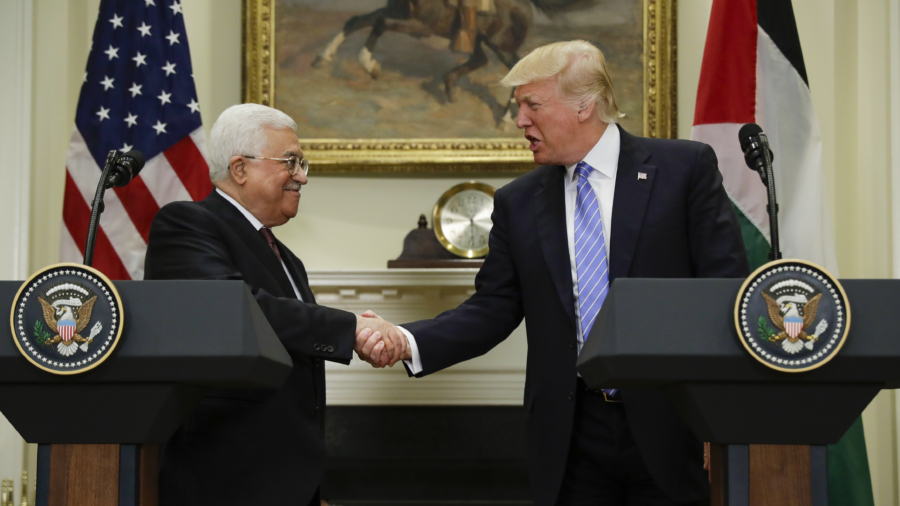WASHINGTON (AP) — President Donald Trump promised on Wednesday “to do whatever is necessary” to forge an Israeli-Palestinian peace deal.
At a White House meeting with Palestinian leader Mahmoud Abbas, Trump pledged to reinvigorate the stalled Mideast peace process that has bedeviled his predecessors and said he would serve as “a mediator, an arbitrator or a facilitator” between the two sides. “We will get it done,” Trump confidently told Abbas.
“I’m committed to working with Israel and the Palestinians to reach an agreement,” Trump said. “But any agreement cannot be imposed by the United States or by any other nation. The Palestinians and Israelis must work together to reach an agreement that allows both peoples to live, worship, and thrive and prosper in peace.”
The peace process has been stalled since 2014, and there have been no serious attempts to restart negotiations.
Like previous U.S. leaders, Trump faces numerous obstacles in the bid. They include the contours of a potential Palestinian state, Jerusalem’s status and the question of Palestinian refugees. Complicating it all are the vehement Palestinian criticisms of Israeli settlement construction and Israeli complaints that Palestinians are inciting violence.
Abbas insisted he is committed to peace, but he made clear Palestinian demands for a separate state based on borders that existed before the 1967 Mideast war, a capital in east Jerusalem and the return of Palestinian refugees.
“Our strategic option, our strategic choice is to bring about peace based on the vision of two states, a Palestinian state, with its capital of east Jerusalem, that lives in peace and stability with the state of Israel based on the borders of 1967,” he said.
Israel rejects the 1967 lines as a possible border, saying it would impose grave security risks. Israel also opposes Palestinian demands on refugees and stakes its claim on an undivided Jerusalem as the capital of the Jewish state.
Trump did not discuss any of those issues Wednesday. But in a February news conference with Israeli Prime Minister Benjamin Netanyahu, Trump broke with longtime U.S. policy by raising the idea of a one-state peace agreement, withholding clear support for an independent Palestine. U.S. officials quickly stressed afterward that Trump would support any arrangement agreed by the two sides.
U.S. officials had said ahead of Wednesday’s meeting that Trump would press Abbas to end payments to families of Palestinians imprisoned in Israeli jails. Three Republican senators urged a halt to such payments in a letter to Trump that reflected widespread opinion in Congress. But Trump didn’t specifically mention that issue in his brief remarks after the Oval Office session.
The stipends are sensitive. Israel considers such payments a reward for terrorists.
Stopping them seems untenable to Abbas, especially at a time of broad Palestinian support in the West Bank for a mass hunger strike by hundreds of Palestinian prisoners held by Israel, now in its 17th day. As Abbas and Trump met, several thousand Palestinians attended a solidarity rally for the prisoners, with speakers calling for a new campaign of civil disobedience against Israeli rule.
In Jerusalem, Israeli Deputy Foreign Minister Tzipi Hotovely criticized Abbas for “continuing to transfer money to the families of terrorists.” ”It’s clear to any intelligent person that Abbas isn’t interested in peace,” she said.
Trump did directly implore the Palestinian leadership to end what Israel and the United States say is anti-Israel rhetoric.
“There can be no lasting peace unless the Palestinian leaders speak in a unified voice against incitement to violate, and violence, and hate,” the president said. “There’s such hatred, but hopefully there won’t be such hatred for very long.”
In his comments, Abbas praised Trump for his “leadership,” “courageous stewardship,” ”wisdom” and “great negotiating ability.”
Abbas said Palestinians are not cultivating a hatred of Israel as he rejected Trump’s position, which is also held by Netanyahu.
“I affirm to you that you are raising our youth, our children, our grandchildren on a culture of peace,” Abbas said.


